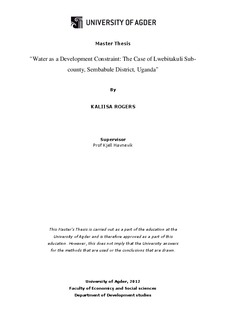| dc.description.abstract | This is a qualitative study that explores people‟s perspectives of water as a constraint to socio-economic development in Lwebitakuli sub-county, Sembabule District, South western Uganda.
Three main research questions were explored: What are the features of socio-economic development in Lwebitakuli? What is the role of water in development? How do people perceive or describe water as a development concern? And what strategies has government, NGOs and community members adopted to cope with the challenges and improve water supply in Lwebitakuli? Data was collected by a triangulation of methods such as; semi-structured interviews, observation and focus group discussions. Interviewees included, community members (both men and women) district water officers, water committee members and community leaders.
The main findings suggest that water is of much importance to the socio-economic development of Lwebitakuli although the importance attached differed between the different gender groups. For example men looked at water as necessary for their productive economic activities, while women saw it as a necessity to performing their daily domestic activities. Despite the fact that, the right to water is a human right and accessibility is of paramount importance, the study found that, the majority of people in Lwebitakuli did not have access to safe water with coverage of 21% only. It was further revealed that, the most common water sources were boreholes and dams but these were broken and non-functional. This meant that, different users especially men walked long distances up to 20kms in extreme cases in search of water, which wastes the productive time for work. Schools too were significantly affected with children spending substantial school time searching for water for their personal and teacher use at school. Some strategies such as water harvesting, boreholes and ponds have been applied but still, they have had limited impact on the problem.
The study concluded that, water is a major constraint to socio-economic development in Lwebitakuli since it affects most of the key sectors of development such as health, education and people‟s major economic activities. The study recommended that, stakeholders like the government need to take appropriate measures to ensure, sustainable access to water in Lwebitakuli through specific action areas such as increasing funding to water projects, encouraging rain water harvesting, investment in new water facilities, rehabilitating viable point sources such as dams and boreholes as well as increasing participation of local people in water resource planning and management. | no_NO |
